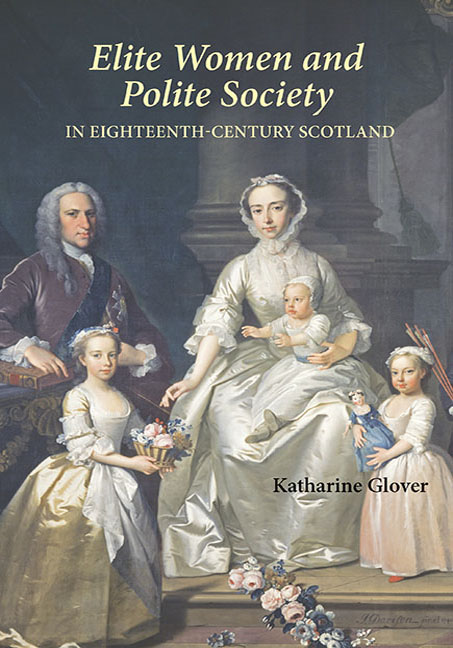Book contents
- Frontmatter
- Contenst
- Dedication
- Acknowledgements
- List of Abbreviations
- Preface
- 1 Elite Women and Eighteenth-Century Scottish Society
- 2 Education and Upbringing
- 3 Reading and Print Culture
- 4 Polite Sociability: Space and Social Practices
- 5 Politics and Influence
- 6 Travel, Tourism and Place
- Conclusion
- Appendix Biographical Backgrounds
- Bibliography
- Index
- Frontmatter
- Contenst
- Dedication
- Acknowledgements
- List of Abbreviations
- Preface
- 1 Elite Women and Eighteenth-Century Scottish Society
- 2 Education and Upbringing
- 3 Reading and Print Culture
- 4 Polite Sociability: Space and Social Practices
- 5 Politics and Influence
- 6 Travel, Tourism and Place
- Conclusion
- Appendix Biographical Backgrounds
- Bibliography
- Index
Summary
In recent years, British historians have sought to reach beyond the instruments of state and those who wielded them, beyond the metropolis and its dominant culture, and into a much more varied hinterland of historical experience populated by individuals, women as well as men, whose personal life experiences might be deemed uneventful and unremarkable. Through such personal sources, this book has explored the impact of polite social practices on the women of the Scottish gentry and aristocracy, ca. 1720–70. It is through such sources as the schoolgirl letters and journals of Amelie Murray, through the page upon page of Martha Fletcher's dense copyings from historical texts, through the gossipy exchanges of her nieces and the scrawled political communications of her sister Mary Hepburn, or through the opinionated cultural and economic comments which the experience of travelling encouraged Margaret Steuart Calderwood to record for posterity that the day-to-day social workings of those eighteenth-century Scotswomen who would have considered themselves ‘polite’ are most vividly revealed. Whilst as individuals they may have made little impact on the grand historical narratives that have tended to dominate historical scholarship, taken collectively their experiences constitute the essence of the societies in which they lived. Women like Betty Fletcher and Amelie Murray deserve to take their place alongside their more well-known fathers as actors and commentators in the Scottish historical narrative.
Like Amanda Vickery's study of Georgian gentlewomen in northern England, this work has not, on the whole, been concerned with ‘nonconformity or rebellion’. Most of the women under consideration here performed no particularly unusual or remarkable deeds. In the personal sources on which this book has been based they offered few, if any, criticisms of the society in which they lived. Instead, this study has focused on the possibilities presented to or left open for women by the prevailing cultural norms of polite society. Following those who have urged the importance of scholarship which considers women's history not in terms of exclusions but in terms of access, it has asked what opportunities these polite social practices presented to women. It has asked how women used these opportunities, and considered the degree to which access to these opportunities was constrained or restricted by factors like geography, birth-order or the life-course.
- Type
- Chapter
- Information
- Elite Women and Polite Society in Eighteenth-Century Scotland , pp. 166 - 172Publisher: Boydell & BrewerPrint publication year: 2011

